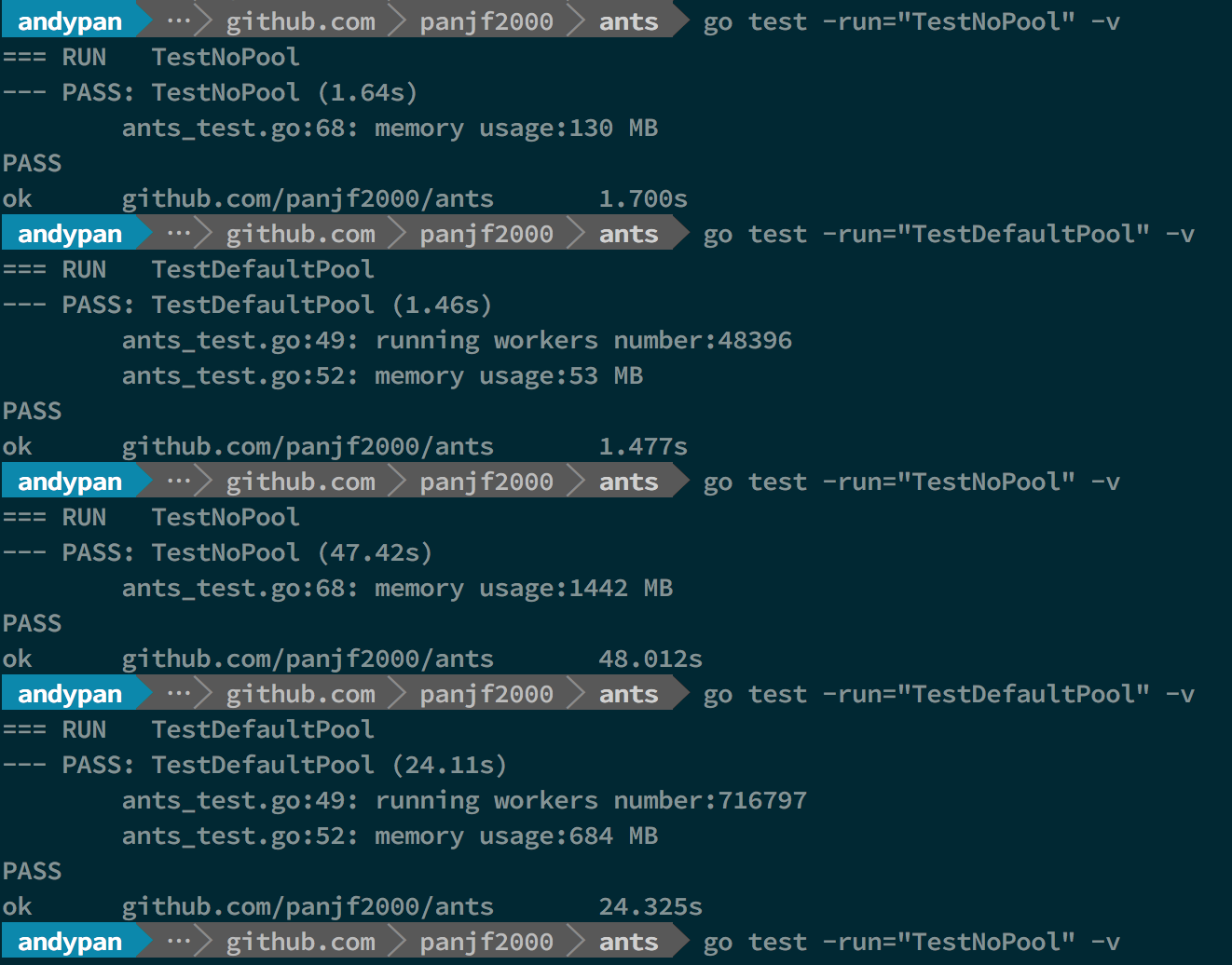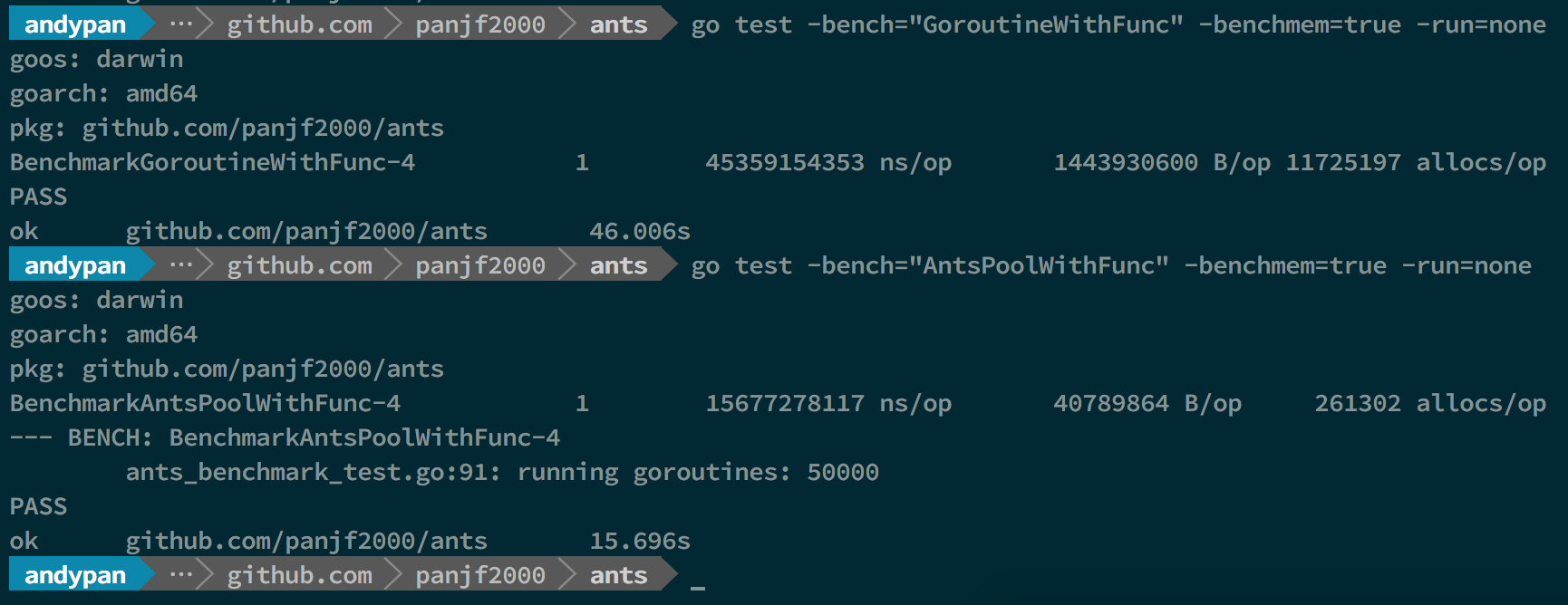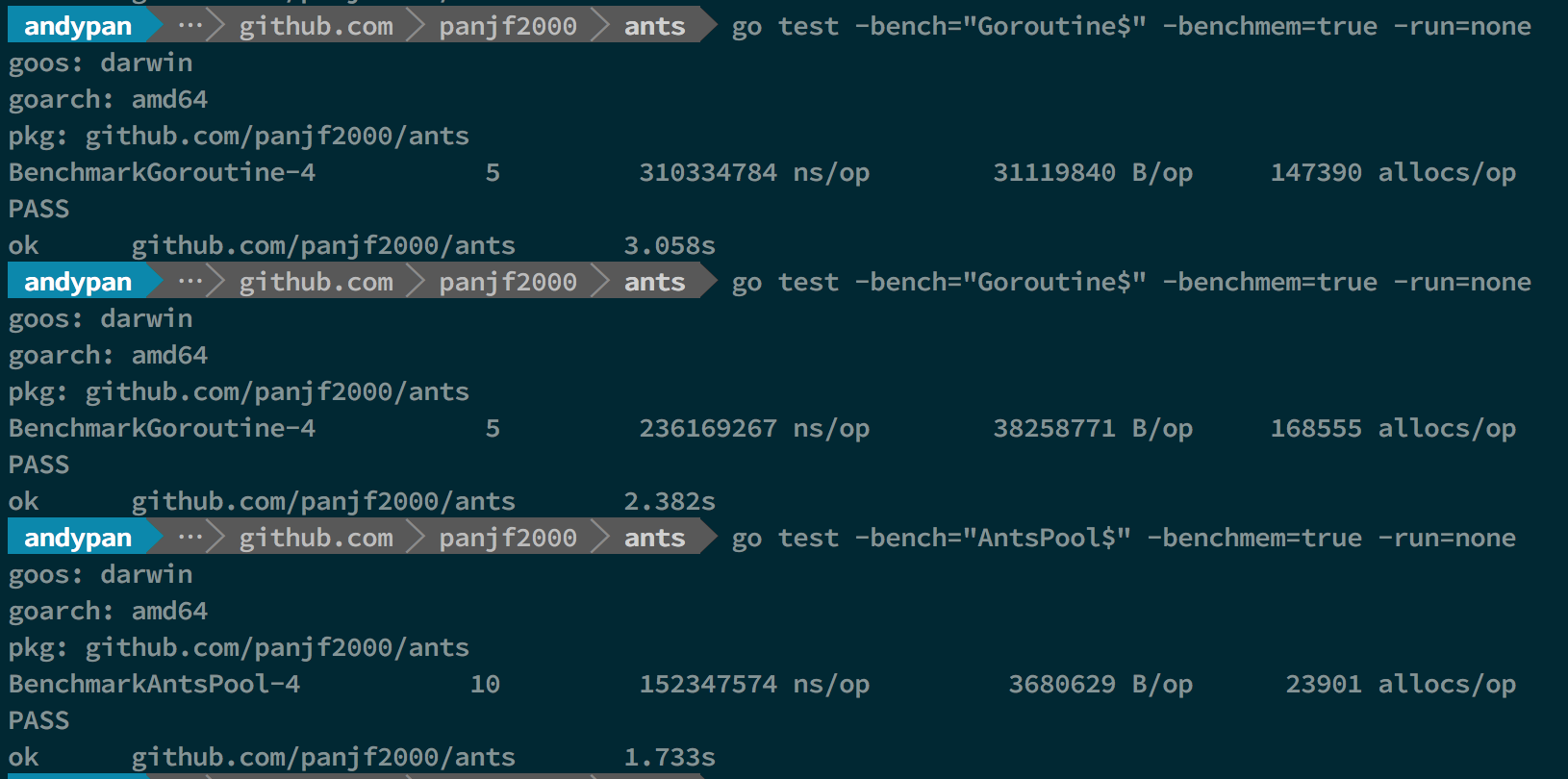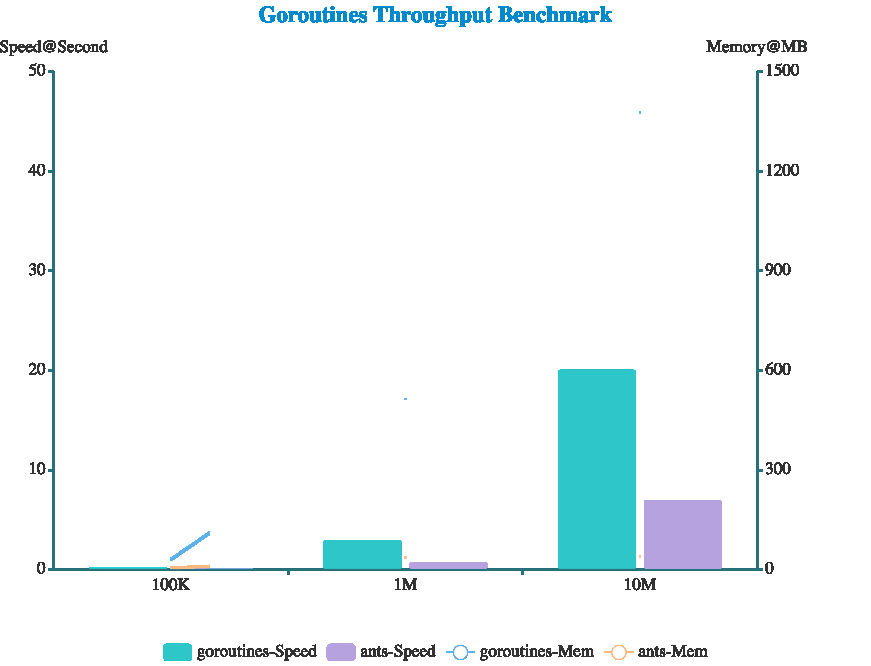mirror of https://github.com/panjf2000/ants.git
320 lines
10 KiB
Markdown
320 lines
10 KiB
Markdown
# ants
|
||
<p align="center">
|
||
<img src="https://user-images.githubusercontent.com/7496278/51748488-8efd2600-20e7-11e9-91f5-1c5b466dcca1.jpg"/>
|
||
A goroutine pool for Go
|
||
<br/><br/>
|
||
<a title="Build Status" target="_blank" href="https://travis-ci.com/panjf2000/ants"><img src="https://img.shields.io/travis/com/panjf2000/ants?style=flat-square"></a>
|
||
<a title="Codecov" target="_blank" href="https://codecov.io/gh/panjf2000/ants"><img src="https://img.shields.io/codecov/c/github/panjf2000/ants?style=flat-square"></a>
|
||
<a title="Go Report Card" target="_blank" href="https://goreportcard.com/report/github.com/panjf2000/ants"><img src="https://goreportcard.com/badge/github.com/panjf2000/ants?style=flat-square"></a>
|
||
<a title="Ants on Sourcegraph" target="_blank" href="https://sourcegraph.com/github.com/panjf2000/ants?badge"><img src="https://sourcegraph.com/github.com/panjf2000/ants/-/badge.svg?style=flat-square"></a>
|
||
<br/>
|
||
<a title="" target="_blank" href="https://golangci.com/r/github.com/panjf2000/ants"><img src="https://golangci.com/badges/github.com/panjf2000/ants.svg"></a>
|
||
<a title="Godoc for ants" target="_blank" href="https://godoc.org/github.com/panjf2000/ants"><img src="https://img.shields.io/badge/godoc-reference-5272B4.svg?style=flat-square"></a>
|
||
<a title="Release" target="_blank" href="https://github.com/panjf2000/ants/releases"><img src="https://img.shields.io/github/release/panjf2000/ants.svg?style=flat-square"></a>
|
||
<a title="License" target="_blank" href="https://opensource.org/licenses/mit-license.php"><img src="https://img.shields.io/aur/license/pac?style=flat-square"></a>
|
||
</p>
|
||
|
||
[中文](README_ZH.md) | [Project Blog](https://taohuawu.club/high-performance-implementation-of-goroutine-pool)
|
||
|
||
Library `ants` implements a goroutine pool with fixed capacity, managing and recycling a massive number of goroutines, allowing developers to limit the number of goroutines in your concurrent programs.
|
||
|
||
## Features:
|
||
|
||
- Automatically managing and recycling a massive number of goroutines.
|
||
- Periodically purging overdue goroutines.
|
||
- Friendly interfaces: submitting tasks, getting the number of running goroutines, tuning capacity of pool dynamically, closing pool.
|
||
- Handle panic gracefully to prevent programs from crash.
|
||
- Efficient in memory usage and it even achieves higher performance than unlimited goroutines in golang.
|
||
|
||
## Tested in the following Golang versions:
|
||
|
||
- 1.8.x
|
||
- 1.9.x
|
||
- 1.10.x
|
||
- 1.11.x
|
||
- 1.12.x
|
||
|
||
|
||
## How to install
|
||
|
||
``` sh
|
||
go get -u github.com/panjf2000/ants
|
||
```
|
||
|
||
## How to use
|
||
Just take a imagination that your program starts a massive number of goroutines, from which a vast amount of memory will be consumed. To mitigate that kind of situation, all you need to do is to import `ants` package and submit all your tasks to a default pool with fixed capacity, activated when package `ants` is imported:
|
||
|
||
``` go
|
||
package main
|
||
|
||
import (
|
||
"fmt"
|
||
"sync"
|
||
"sync/atomic"
|
||
"time"
|
||
|
||
"github.com/panjf2000/ants"
|
||
)
|
||
|
||
var sum int32
|
||
|
||
func myFunc(i interface{}) {
|
||
n := i.(int32)
|
||
atomic.AddInt32(&sum, n)
|
||
fmt.Printf("run with %d\n", n)
|
||
}
|
||
|
||
func demoFunc() {
|
||
time.Sleep(10 * time.Millisecond)
|
||
fmt.Println("Hello World!")
|
||
}
|
||
|
||
func main() {
|
||
defer ants.Release()
|
||
|
||
runTimes := 1000
|
||
|
||
// Use the common pool.
|
||
var wg sync.WaitGroup
|
||
syncCalculateSum := func() {
|
||
demoFunc()
|
||
wg.Done()
|
||
}
|
||
for i := 0; i < runTimes; i++ {
|
||
wg.Add(1)
|
||
_ = ants.Submit(syncCalculateSum)
|
||
}
|
||
wg.Wait()
|
||
fmt.Printf("running goroutines: %d\n", ants.Running())
|
||
fmt.Printf("finish all tasks.\n")
|
||
|
||
// Use the pool with a function,
|
||
// set 10 to the capacity of goroutine pool and 1 second for expired duration.
|
||
p, _ := ants.NewPoolWithFunc(10, func(i interface{}) {
|
||
myFunc(i)
|
||
wg.Done()
|
||
})
|
||
defer p.Release()
|
||
// Submit tasks one by one.
|
||
for i := 0; i < runTimes; i++ {
|
||
wg.Add(1)
|
||
_ = p.Invoke(int32(i))
|
||
}
|
||
wg.Wait()
|
||
fmt.Printf("running goroutines: %d\n", p.Running())
|
||
fmt.Printf("finish all tasks, result is %d\n", sum)
|
||
}
|
||
```
|
||
|
||
## Integrate with http server
|
||
```go
|
||
package main
|
||
|
||
import (
|
||
"io/ioutil"
|
||
"net/http"
|
||
|
||
"github.com/panjf2000/ants"
|
||
)
|
||
|
||
type Request struct {
|
||
Param []byte
|
||
Result chan []byte
|
||
}
|
||
|
||
func main() {
|
||
pool, _ := ants.NewPoolWithFunc(100000, func(payload interface{}) {
|
||
request, ok := payload.(*Request)
|
||
if !ok {
|
||
return
|
||
}
|
||
reverseParam := func(s []byte) []byte {
|
||
for i, j := 0, len(s)-1; i < j; i, j = i+1, j-1 {
|
||
s[i], s[j] = s[j], s[i]
|
||
}
|
||
return s
|
||
}(request.Param)
|
||
|
||
request.Result <- reverseParam
|
||
})
|
||
defer pool.Release()
|
||
|
||
http.HandleFunc("/reverse", func(w http.ResponseWriter, r *http.Request) {
|
||
param, err := ioutil.ReadAll(r.Body)
|
||
if err != nil {
|
||
http.Error(w, "request error", http.StatusInternalServerError)
|
||
}
|
||
defer r.Body.Close()
|
||
|
||
request := &Request{Param: param, Result: make(chan []byte)}
|
||
|
||
// Throttle the requests traffic with ants pool. This process is asynchronous and
|
||
// you can receive a result from the channel defined outside.
|
||
if err := pool.Invoke(request); err != nil {
|
||
http.Error(w, "throttle limit error", http.StatusInternalServerError)
|
||
}
|
||
|
||
w.Write(<-request.Result)
|
||
})
|
||
|
||
http.ListenAndServe(":8080", nil)
|
||
}
|
||
```
|
||
|
||
## Functional options for ants pool
|
||
|
||
```go
|
||
type Options struct {
|
||
// ExpiryDuration set the expired time (second) of every worker.
|
||
ExpiryDuration time.Duration
|
||
|
||
// PreAlloc indicate whether to make memory pre-allocation when initializing Pool.
|
||
PreAlloc bool
|
||
|
||
// Max number of goroutine blocking on pool.Submit.
|
||
// 0 (default value) means no such limit.
|
||
MaxBlockingTasks int
|
||
|
||
// When Nonblocking is true, Pool.Submit will never be blocked.
|
||
// ErrPoolOverload will be returned when Pool.Submit cannot be done at once.
|
||
// When Nonblocking is true, MaxBlockingTasks is inoperative.
|
||
Nonblocking bool
|
||
|
||
// PanicHandler is used to handle panics from each worker goroutine.
|
||
// if nil, panics will be thrown out again from worker goroutines.
|
||
PanicHandler func(interface{})
|
||
}
|
||
|
||
func WithOptions(options Options) Option {
|
||
return func(opts *Options) {
|
||
*opts = options
|
||
}
|
||
}
|
||
|
||
func WithExpiryDuration(expiryDuration time.Duration) Option {
|
||
return func(opts *Options) {
|
||
opts.ExpiryDuration = expiryDuration
|
||
}
|
||
}
|
||
|
||
func WithPreAlloc(preAlloc bool) Option {
|
||
return func(opts *Options) {
|
||
opts.PreAlloc = preAlloc
|
||
}
|
||
}
|
||
|
||
func WithMaxBlockingTasks(maxBlockingTasks int) Option {
|
||
return func(opts *Options) {
|
||
opts.MaxBlockingTasks = maxBlockingTasks
|
||
}
|
||
}
|
||
|
||
func WithNonblocking(nonblocking bool) Option {
|
||
return func(opts *Options) {
|
||
opts.Nonblocking = nonblocking
|
||
}
|
||
}
|
||
|
||
func WithPanicHandler(panicHandler func(interface{})) Option {
|
||
return func(opts *Options) {
|
||
opts.PanicHandler = panicHandler
|
||
}
|
||
}
|
||
```
|
||
|
||
`ants.Options`contains all optional configurations of ants pool, which allow you to customize the goroutine pool by invoking option functions to set up each configuration in `NewPool`/`NewPoolWithFunc`method.
|
||
|
||
## Customize limited pool
|
||
|
||
`ants` also supports customizing the capacity of pool. You can invoke the `NewPool` method to instantiate a pool with a given capacity, as following:
|
||
|
||
``` go
|
||
// Set 10000 the size of goroutine pool
|
||
p, _ := ants.NewPool(10000)
|
||
```
|
||
|
||
## Submit tasks
|
||
Tasks can be submitted by calling `ants.Submit(func())`
|
||
```go
|
||
ants.Submit(func(){})
|
||
```
|
||
|
||
## Tune pool capacity in runtime
|
||
You can tune the capacity of `ants` pool in runtime with `Tune(int)`:
|
||
|
||
``` go
|
||
pool.Tune(1000) // Tune its capacity to 1000
|
||
pool.Tune(100000) // Tune its capacity to 100000
|
||
```
|
||
|
||
Don't worry about the synchronous problems in this case, the method here is thread-safe (or should be called goroutine-safe).
|
||
|
||
## Pre-malloc goroutine queue in pool
|
||
|
||
`ants` allows you to pre-allocate memory of goroutine queue in pool, which may get a performance enhancement under some special certain circumstances such as the scenario that requires an pool with ultra-large capacity, meanwhile each task in goroutine lasts for a long time, in this case, pre-mallocing will reduce a lot of costs when re-slicing goroutine queue.
|
||
|
||
```go
|
||
// ants will pre-malloc the whole capacity of pool when you invoke this method
|
||
p, _ := ants.NewPool(100000, ants.WithPreAlloc(true))
|
||
```
|
||
|
||
## Release Pool
|
||
|
||
```go
|
||
pool.Release()
|
||
```
|
||
|
||
## About sequence
|
||
All tasks submitted to `ants` pool will not be guaranteed to be addressed in order, because those tasks scatter among a series of concurrent workers, thus those tasks would be executed concurrently.
|
||
|
||
## Benchmarks
|
||
|
||
```
|
||
OS: macOS High Sierra
|
||
Processor: 2.7 GHz Intel Core i5
|
||
Memory: 8 GB 1867 MHz DDR3
|
||
|
||
Go Version: 1.9
|
||
```
|
||
|
||
<div align="center"><img src="https://user-images.githubusercontent.com/7496278/51515466-c7ce9e00-1e4e-11e9-89c4-bd3785b3c667.png"/></div>
|
||
In that benchmark-picture, the first and second benchmarks performed test cases with 1M tasks and the rest of benchmarks performed test cases with 10M tasks, both in unlimited goroutines and `ants` pool, and the capacity of this `ants` goroutine-pool was limited to 50K.
|
||
|
||
- BenchmarkGoroutine-4 represents the benchmarks with unlimited goroutines in golang.
|
||
|
||
- BenchmarkPoolGroutine-4 represents the benchmarks with a `ants` pool.
|
||
|
||
The test data above is a basic benchmark and more detailed benchmarks are about to be uploaded later.
|
||
|
||
### Benchmarks with Pool
|
||
|
||

|
||
|
||
In above benchmark picture, the first and second benchmarks performed test cases with 1M tasks and the rest of benchmarks performed test cases with 10M tasks, both in unlimited goroutines and `ants` pool, and the capacity of this `ants` goroutine-pool was limited to 50K.
|
||
|
||
**As you can see, `ants` can up to 2x faster than goroutines without pool (10M tasks) and it only consumes half the memory comparing with goroutines without pool. (both 1M and 10M tasks)**
|
||
|
||
### Benchmarks with PoolWithFunc
|
||
|
||

|
||
|
||
### Throughput (it is suitable for scenarios where asynchronous tasks are submitted despite of the final results)
|
||
|
||
#### 100K tasks
|
||
|
||

|
||
|
||
#### 1M tasks
|
||
|
||

|
||
|
||
#### 10M tasks
|
||
|
||

|
||
|
||
### Performance Summary
|
||
|
||

|
||
|
||
**In conclusion, `ants` can up to 2x~6x faster than goroutines without a pool and the memory consumption is reduced by 10 to 20 times.**
|